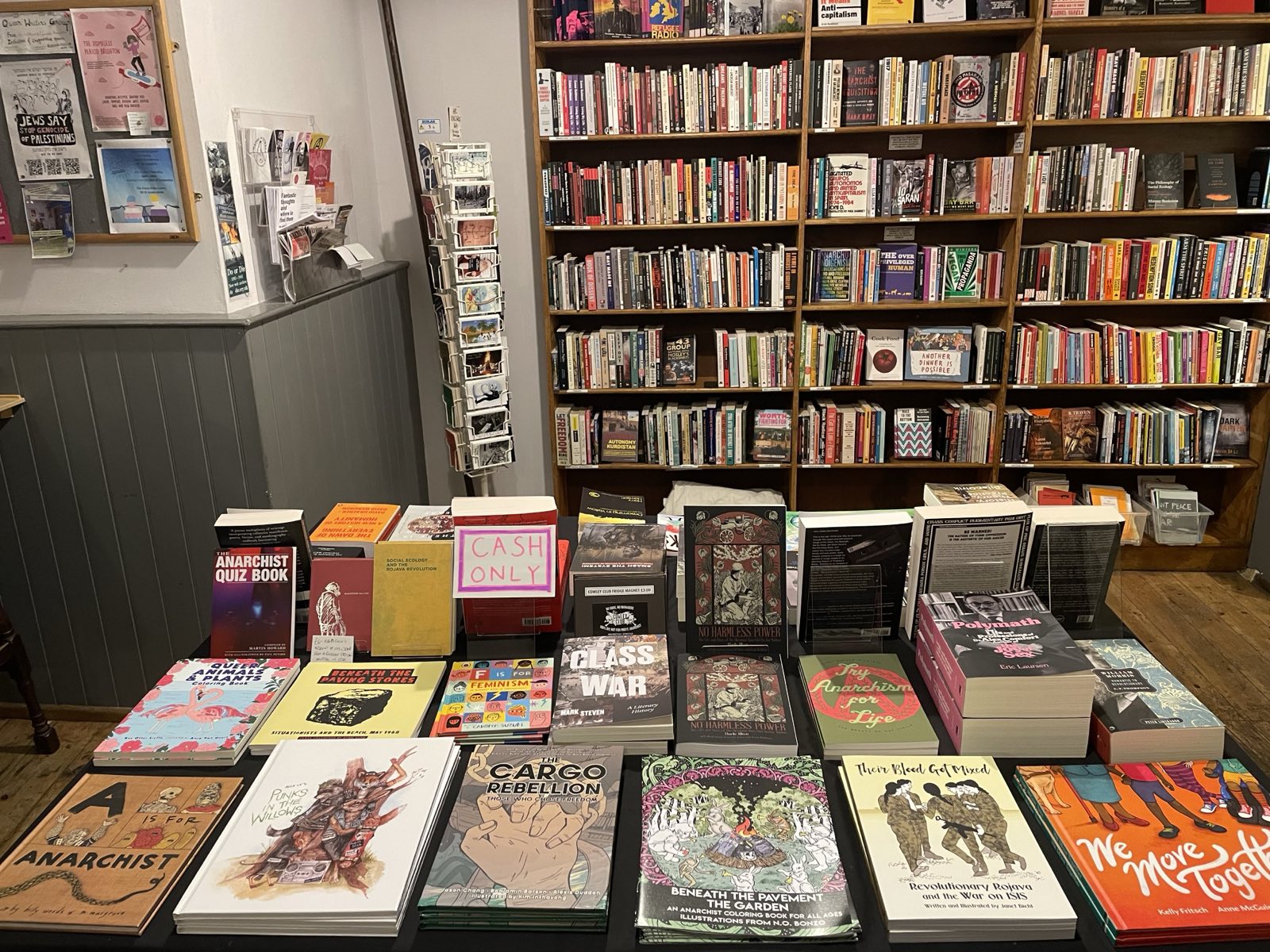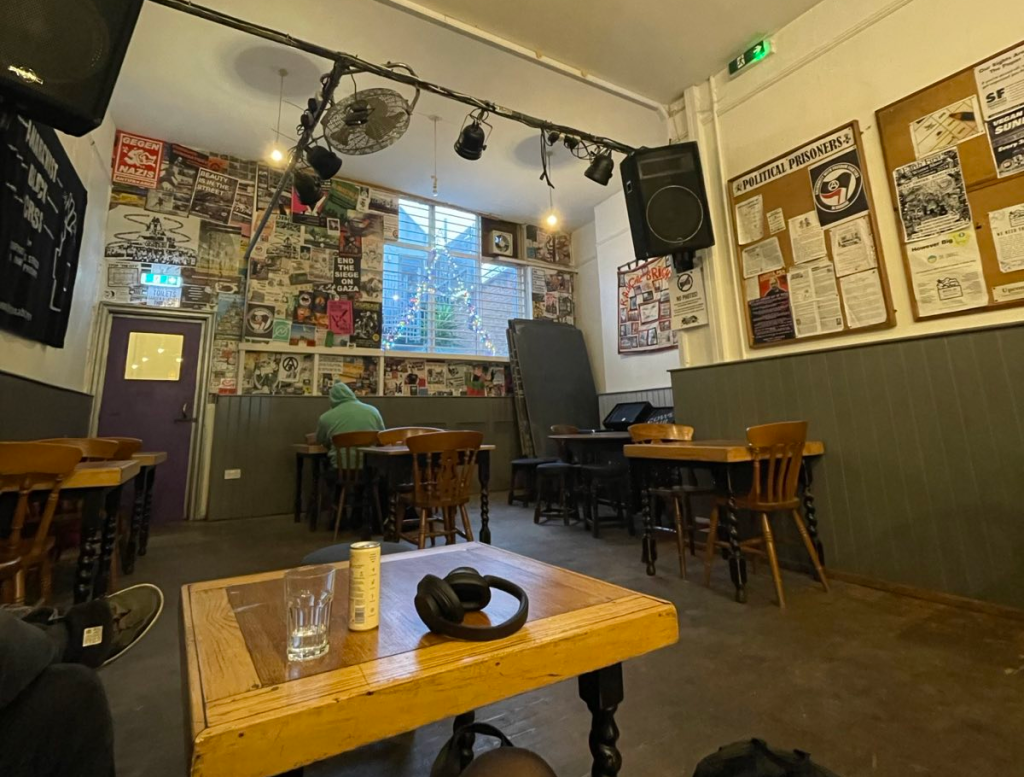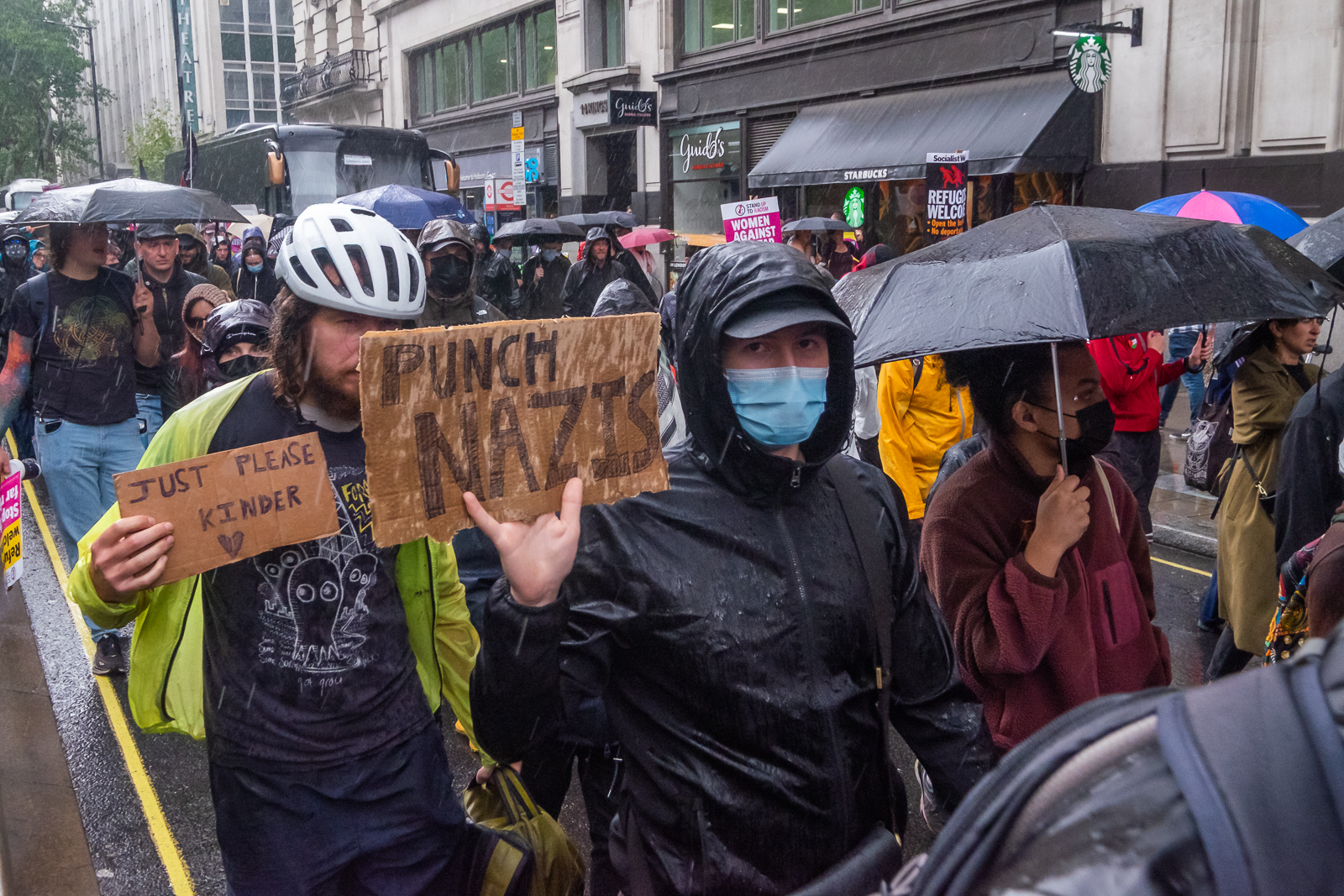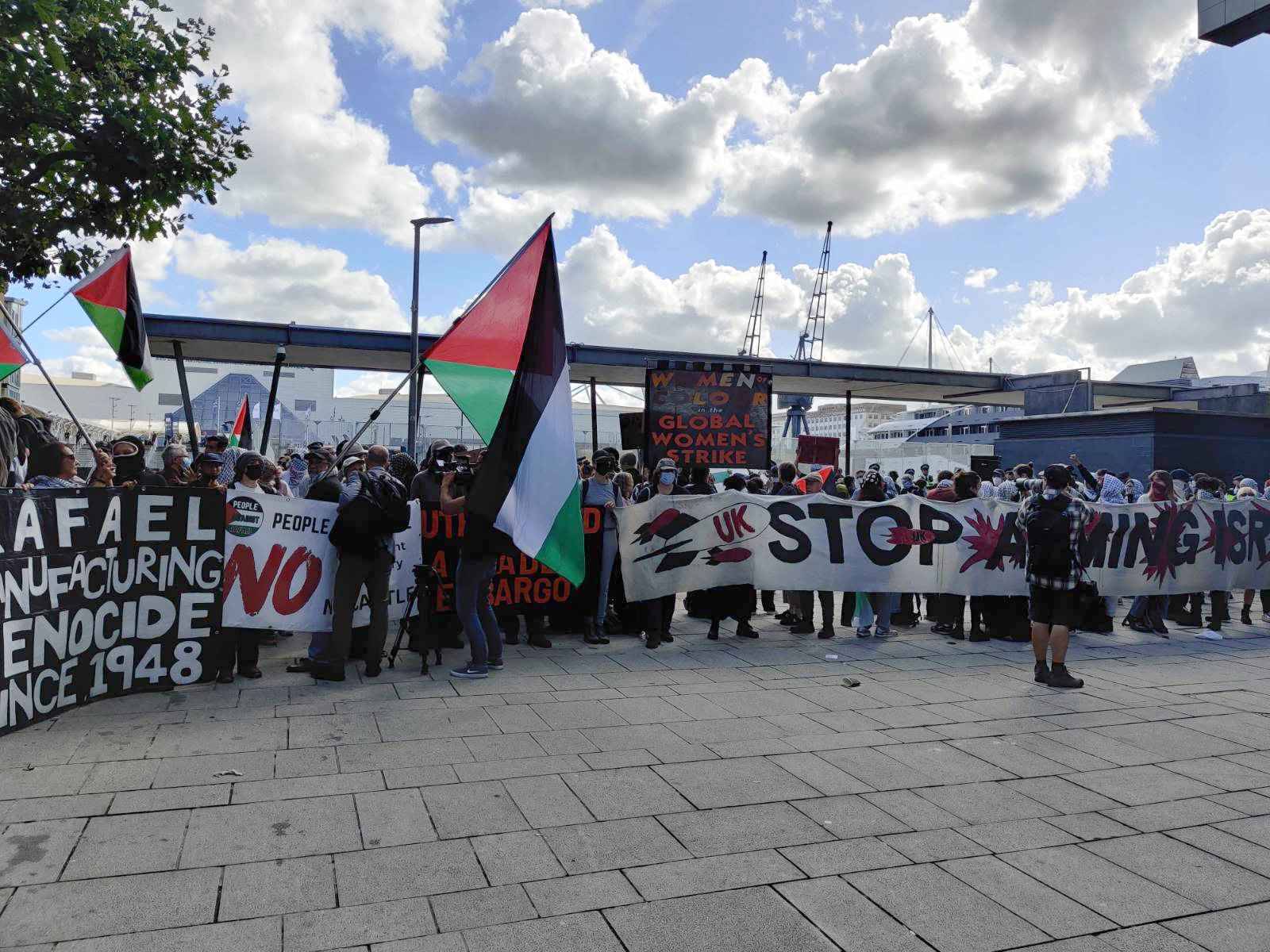One of UK’s longest running social centres, the Cowley Club is Brighton is structured as a members-run co-operative
~ Interviewed by Zosia Brom ~
Can you tell us about who you are and how it all started and what are your activities?
We are the Cowley Club, a social centre in Brighton, we’ve been around since 2003, so for quite some time. It all started of a need for a space that not only fosters anarchist principles of organising but also serves as a community hub for various activist movements. Over the years, we’ve transformed into a collective with a whole range of activities. We’ve got a vegan café that serves up delicious grub, an anarchist bookshop where you can find everything from theory to zines, and a foodbank for those in need. But that’s not all!
We also offer a meeting space for different activist groups—think of it as a home base for grassroots organisations. Our library is stocked with radical literature, and we host cultural events that are open to all.
It’s about creating an environment where people feel welcome and can engage in discussions and actions that matter to them. Honestly, we’re always looking for ways to expand our activities, so who knows what’s next on the agenda
What are the core values that guide the Club, and how do you ensure that those values are reflected in daily activities?
Quoting text on our window boards- “For a social system based on mutual aid and voluntary co-operation: against all forms of oppression. To establish a share in the general prosperity for all- the braking down of racial, religious, national, gender and sex barriers- to resist ecological destruction, and to fight for the life on one earth”. In simpler terms, we are guided by anarchist principles of grassroots organising and ” no gods, no managers” approach and we are trying as much as possible for all those values to be reflected in how we organise in day to day basis and to remain free of the influence from the political parties, even the “progressive” ones.
Why do you think maintaining social centres such as Cowley is important?
As the world around us becomes increasingly grim—thanks to the cost of living crisis, rampant gentrification, and the looming threat of ecological collapse—spaces like the Cowley Club become more crucial than ever. We provide an alternative to the oppressive structures that are being imposed on us, showcasing different ways to organise our lives. This isn’t just about having a place to hang out; it’s about creating a resource for the movement, a space for people to come together, socialise, and plan for change.

In these turbulent times, social centres like ours play a vital role in fostering community resilience and solidarity. They remind us that we’re not alone in this fight and that we can work together to build a world that aligns with our values—one based on cooperation and mutual aid rather than competition and individualism.
What role does the club play in fostering local activism, and how do you engage with other grassroots movements in Brighton and beyond?
First and foremost, we’re all about providing accessible space for important projects and groups in the area. We’ve hosted a range of organisations, including the Solidarity Federation, Anarchist Black Cross, Brighton Antifascists, and Brighton Hunt Saboteurs. These groups use our space not just to meet, but also to fundraise and strategise. Some of the initiatives are long-term, while others pop up in response to immediate needs—they’re all equally important in the grand scheme of things.
We also love organising book talks, discussions, film screenings, and prisoner support events. Each of these activities helps to cultivate a sense of community and encourage dialogue around pressing issues. Honestly, we’d love to do even more, but a lot of our energy is dedicated to ensuring that we can keep the doors open and the lights on. It’s a juggling act, but every event and gathering adds to the tapestry of local activism and reinforces the idea that we’re all in this together.
What impact has the Cowley Club had on the Brighton community?
Over the years, I’d say the Cowley Club has made quite a significant impact on the Brighton community. We’ve provided a space where people can connect, organise, and feel a sense of belonging. The visibility of our activities has helped to normalise discussions around anarchism and grassroots activism, making these concepts more accessible to the wider public.
We’ve also served as a support network during crises, whether it’s through our foodbank or by hosting events that raise awareness about social issues. By offering a safe space for people to come together and learn, we’ve empowered many individuals to get involved in activism in their own communities. The relationships formed here often extend beyond our walls, creating lasting networks of solidarity.
How do you see the role of social centres like the Cowley Club evolving in the future?
As the world continues to spiral into various crises—social, ecological, and economic—the role of social centres like the Cowley Club will undoubtedly become even more vital. These spaces will be essential not just for providing resources, but for nurturing the next generation of activists and organisers.

In the face of ongoing challenges, we’ll need to adapt and evolve, finding new ways to meet the needs of our community while remaining true to our anarchist principles. We envision Cowley as a place where creative solutions emerge, where people can experiment with new ideas and practices in organising. Whether it’s tackling the cost-of-living crisis or responding to ecological disasters, we want to be at the forefront of creating and sharing resources that empower others to act.
What future projects or initiatives are in the pipeline for the Cowley Club?
There are loads of plans and ideas swirling around, but we’re currently limited by the fact that our volunteers can only do so much. The reality is that we need to strike a balance between what we want to do and what we can actually achieve with our current resources.
How is the Club funded, and what are the financial challenges of running such a space?
We’ve got a mix of funding sources keeping the Cowley Club afloat. Primarily, we rely on the bar and various events we host, alongside support from a housing cooperative that has a flat in our building and donations from our supporters. But let’s be real: the financial challenges are ever-present. Everything keeps getting more expensive—interest rates, utilities, you name it!
Our building is over a century old, and with that comes the constant need for repairs, big and small. On top of that, we’re dealing with some historic debts that we’re working to pay off. It cost over £3,000 a month to keep the place running, and it often feels like a constant struggle to secure this much money. We are all working together to find ways to fundraise and sustain our space.
What role do volunteers play in the day-to-day operations of the Club?
Volunteers are the heartbeat of the Cowley Club. The whole place runs on volunteer power—without them, we simply wouldn’t exist. They handle everything from serving in the café and managing events to keeping the bookshop stocked and the space clean. It’s an all-hands-on-deck situation, and we truly value each and every volunteer that walks through our doors.
The more volunteers we have, the more energy we can generate, and that opens up the opportunity for even more projects and activities. It’s about building a community of people who share a common vision and want to contribute to something greater than themselves. Plus, it’s a great way to meet like-minded folks and learn new skills along the way!
If someone told you they were planning to open their own social centre, based on your experience of running Cowley, what advice would you give them?
First off, I’d say: go for it! There’s a real need for more spaces like this, and every community can benefit from a social centre. But my advice would be to plan well. Do your research and talk to others who have experience running social centres—there’s a wealth of knowledge out there, and learning from others’ successes and mistakes can save you a lot of time and effort.
Keep in mind that every area has its own unique vibe, and what works in one place might not translate directly to another. So, while it’s great to gather inspiration from other projects, stay flexible and adaptable to your own community’s needs. Lastly, don’t forget to have fun! Building a social centre is about creating a space that reflects your values and brings people together. Embrace the journey and the relationships you’ll build along the way.








